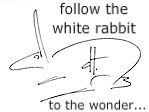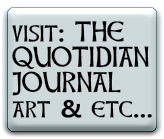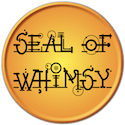 visit the IMAGE homepage/blog by clicking here
visit the IMAGE homepage/blog by clicking here Another spectacular issue...here are some of my favorite quotes:
Gregory Wolfe on Geoffrey Hill"The work he expects us to do is the best possible kind: the deep imaginative labor of making connections and understanding contexts - which, in the end, is a pleasurable form of serious play." (pg. 4)
"The ancient rhetorical mode of "praise and blame" calls on the poet to engage not only in lyric celebration but also prophetic speech." (pg. 5)
"Hill could say, with Aleksandr Solzhenitsyn, a writer he closely resembles: "If only there were evil people somewhere insidiously committing evil deeds, and it were necessary only to separate them from the rest of us and destroy them. But the line dividing good and evil cuts through the heart of every human being. And who is willing to destroy a piece of his own heart?"" (pg. 6)
from James Calvin Schaap's "Pilgrim""What did Calvin say in the early passages of the
Institutes - "Wherever you turn your eyes, there is no portion of the world that does not exhibit some sparks of beauty. It is impossible to contemplate the vast and beautiful fabric without being overwhelmed by the immense weight of glory."
"And Pascal - "You should always keep something beautiful in your mind." (pg. 9)
Paul Dannels on Richard Meier's Jubilee Church"So any building, like any poem, is likely to speak to some better than others, depending on where they're at and where they've come from." (pg. 32)
from "A Conversation with Gregory Orr"Gregory Orr: To me, song is validation of lyric poetry's primal nature. Song exists
inside time to express individual feeling, but it also has the capacity to transcend time. Song emanates from individuals and rises up out of time. Lyric poetry speaks from the very middle of this mystery. Song and lyric poetry have a lot to do with my thinking about the Book.
Image: You write a number of poems about "the Book." What do you mean by the Book?
GO: The Book I am imagining is a gigantic anthology filled with every poem and song ever written. All poems and songs feed into it. The Book is an ultimate jukebox, and iPod as big as the moon from which each person can download that playlist that will help them live. We go to it not for entertainment (as the jukebox or iPod metaphor might imply) but to find the words we need to sustain us. The Book is a huge, accessible repository of testimony about the mysteries and catastrophes and wonders that we experience. We're there to sustain the Book, too, with what we sing, write, and compose. When you write a poem, it's here in time, functioning in your own individual life, and maybe the lives of the people around you. But your poem also goes into the Book, where it has its own life, the span of which may be longer and much different than you've imagined. (pgs. 67-68)
Image: You've talked about the different functions of philosophy, religion, and poetry. Can you say something about what role philosophy and religion play for you in the writing of your own poetry?
GO: Religion, philosophy, poetry - these are three huge cultural repositories of meaning. And we need meanings to live. One of the crucial events of my life was my brother's death in a hunting accident when I was twelve. He was eight. I was holding the gun, and it killed him. I killed him. That was a sudden cataclysmic experience of loss and guilt and grief - and also silence, because in my family, as in many, grief leads to silence, and each member feels a moral duty to silently lift up their own individual, invisible cross of feeling and carry it with them to the grave. On that very same day my brother died, a friend of my parents came into my room, where I was hiding and crying, and, intending to comfort me, said, "Peter is all right. He's already with Jesus. He's sitting down right now at God's table." The image she presented was vivid to me from a number of stained-glass windows I'd seen, probably even one in the church I attended - Jesus sharing a meal with others. But that day, every time I closed my eyes - and I really couldn't open them much that day, I tried to keep them closed - I saw my brother dead at my feet. That was the last image I had of him in the world. Her image of Peter happy and living in heaven and my image of him lying dead at my feet collided - and the stained-glass scene shattered - the image of his inert body abolished any other-world possibility for me. That death and my mother's sudden death two years later abolished al easy and consoling meanings, meanings dependent on security and love. And they established for me the vivid possibility that as a mortal being one could vanish at any moment. In my mother's case, again, it was overnight. That's a particularly startling form of loss. (pg. 70)
...what I love about lyric poetry is that, like the stars, it's just an array. It's an open system that's mysteriously radiant with significance. (pg. 71)
...we want and need to turn our feelings into rhythmic language. (pg. 72)
As A young poet I had faith that images could incarnate meanings and reveal them in a non-rational vivid way. (pg. 73)
GO:...I've taken to trying to persuade my students that there are two aspects of poetry-writing: craft and quest. Craft is everything that you could possibly learn about writing poems, working with language - and the good news is that you're going to spend your whole life on it and only conquer the smallest corner of it. Craft is a vast, mysterious realm, and you may be frustrated exploring it, but you won't be bored because there's always more you don't know, things you long to do but can't. In my opinion, you can never master craft, and that's marvelous. But just as important is quest. Why are you as an individual drawn to poetry? Why is poetry knocking on your door and saying: "There's something I want to do with you?" How does your life intersect with this ambition to write poems? It's exciting to try to answer those and related questions as a young poet. One way of approaching those questions is by considering the poets you most love - because they are your imaginative family, your poetry family, and who they are is almost as important to your development as your biological family was to your earlier life. To find your imaginative relatives - Great-great-grandfather Wordsworth, or made Great-great-uncle William Blake, or strange and amazing Aunt Emily Dickinson. That necessity for young poets to read everything - it's partly to expand your craft knowledge, but just as important is to find your spiritual kin, to fill your poetic family tree. Part of becoming a poet is being reborn into poetry, and your poetic parents and all your relative - they're the poets you love most.
Image: It sounds very Christian.
GO: Well, you're born again as a poet. That's a powerful experience many young poets go through - a spiritual experience. Becoming a poet is obviously not a sensible career choice. There must be a spiritual dimension to it, or else you're an idiot. If poetry were simply an ego experience, it would be foolish, even depressing, but it's not. We all know that. (pgs. 74-75)
Image: You're teaching a class called "How Poetry Can Save Your Life." How can it do that?
GO: It
did save my life. You meet many people whose lives were saved by poetry. We're in danger of dying all of the time - not physically, but of living our lives as if we were dead. All of us lapse into death in life, into an unawareness that being alive is a blessing and a gift, and the only gift we're going to be given...Poets are those who have been saved by poetry, and sometimes their task is to help others survive and regain vitality and discover meaning in existence...The making of poems is the making of meanings. To write a lytic poem is to take the confusion and chaos inside you and translate it into words...When you suffer trauma, you mostly do that passively, as a victim. But when you translate that experience into words and shape it, you become active. You are not longer a passive endurer of experience, but an active shaper of it. You've redeemed something from that chaos. Writing a poem can save your life, and reading a poem can show you that you are not alone. (pgs. 78-79)
Andy Whitman reflects on the music of Bruce Springsteen"
Born to Run was the album that launched Springsteen's career. And in this age of MP3 singles and downloadable cell phone ring tones, it is worth noting that it was intended to be heard as an album, a cycle of songs." (pg. 99)
"All of it, Springsteen insists, is worth telling. All of it, in all its gritty mundaneness, is sacred." (pg. 101)
"I finally figured out that people are pretty much the same wherever you go...There are no unimportant lives, and there are no unimportant moments." (pg. 102)




































